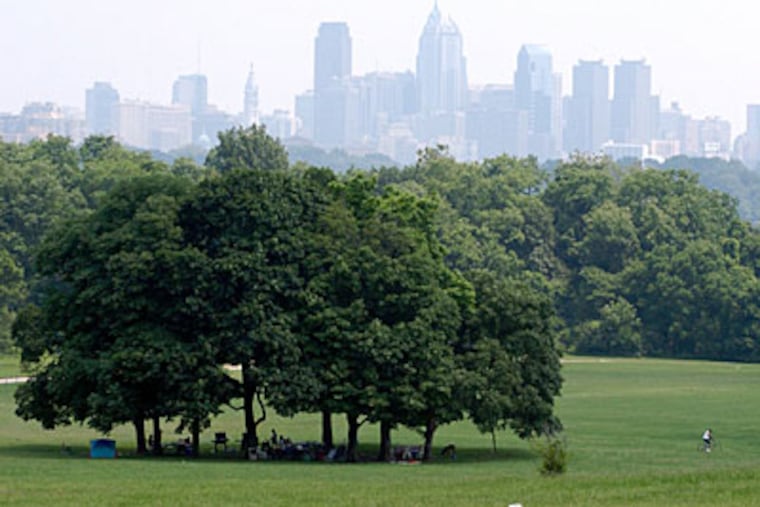Bill could allow construction in Fairmount Park
Only months after voters approved a charter change abolishing the independent Fairmount Park Commission, transferring decision-making power over parkland to the mayor and City Council, legislation has been introduced that would open up the entire park to housing development, parking, building construction, signage, and other uses.

Only months after voters approved a charter change abolishing the independent Fairmount Park Commission, transferring decision-making power over parkland to the mayor and City Council, legislation has been introduced that would open up the entire park to housing development, parking, building construction, signage, and other uses.
Park advocates have expressed "strong opposition" to the bill, a proposed change in the zoning and planning provisions of the city code introduced by Councilwoman Joan L. Krajewski.
Krajewski could not be reached yesterday, but a spokeswoman said the bill was not intended to affect the entire park. Rather, she said, it was an effort to address long-standing problems involving operations of Glen Foerd on the Delaware, a historic estate in Krajewski's district in the Northeast.
Even if the bill is amended to avoid the specter of parkwide construction and parking lots, the sweep of the measure and the speed with which it is moving illustrate potential problems in the wake of last year's charter change, said some park officials and members of the lame-duck Fairmount Park Commission.
The Philadelphia Parks Alliance said it intended to meet with members of the city Planning Commission, Council staff, park officials, and members of the administration to help resolve the matter.
"The bill will be amended to zero in on Glen Foerd," Krajewski's spokeswoman said, adding that a meeting had been set for Friday to address the problems.
The bill is scheduled for a hearing by the Committee on Rules on June 3, and could be voted on by Council within days after that. The Planning Commission will discuss it today.
"Once this thing is done, I don't know how the commissioner of parks and recreation will stop the next one," said Robert N.C. Nix 3d, president of the Fairmount Park Commission, which will cease to exist at the end of June.
Harris Baum, another commission member, said that the legislation would put "decision making in the hands of individual councilmanic members rather than the commission looking at the park as a whole."
The Fairmount Park Commission, established by an 1867 state law, was voted out of existence in November. A new Commission of Parks and Recreation, composed of members of the administration and candidates nominated by Council and selected by the mayor, will have an advisory role, setting policy guidelines on land use and other park matters.
"Whatever you want to say about the [Fairmount Park] Commission, at least it was a sounding board. Now there is no hurdle" for potential developers, said Nix. He argued that "councilmanic prerogative," which grants Council members sway over zoning and land use in their districts, could ultimately govern park use.
"You'll need a really, really strong mayor to fight it," said Nix.
Michael DiBerardinis, commissioner of the city's newly combined park and recreation department, said the Nutter administration was "concerned about the sweeping and broad nature of the bill" and would work to rein it in.
"In the future, the first thing I want to do with the park and recreation advisory commission is work on a set of approaches and policy recommendations on the use and disposition of parkland," DiBerardinis said. "Advisory commissions can have real force if they take something seriously."
Councilman Darrell L. Clarke, who sponsored the charter-change legislation with Councilwoman Blondell Reynolds Brown, argued that the bill would have high visibility in Council.
"I don't think the charter change has any effect one way or the other," Clarke said. "Had this been done at the park commission level, I question whether the average person would have known about it." The Fairmount Park Commission had no authority to legislate, but its approval was necessary for park construction and land sales.
Reynolds Brown said the bill would "be heard in a public way."
"The advisory board will have a role, a very meaningful role, in formulating positions," she said.